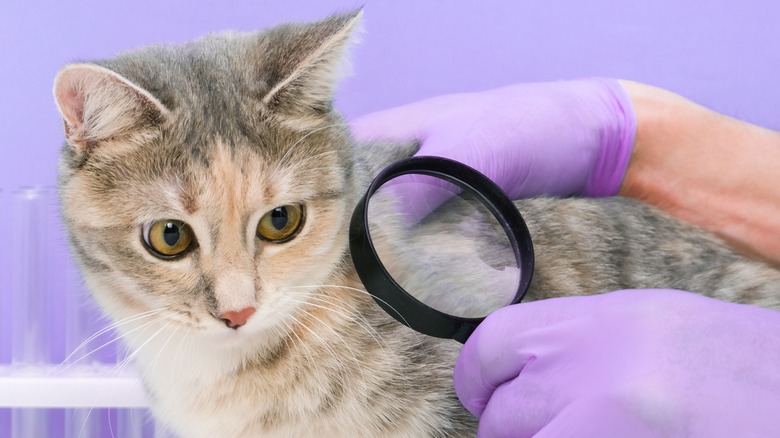How To Treat A Skin Allergy In Cats
Just like people, cats can also experience allergic reactions. How do you know if your feline friend is suffering from skin allergies? According to VCA Animal Hospitals, scabs and intense scratching or chewing are all symptoms. If you notice these signs in your cats, there's a good chance your pet has allergies.
PetMD warns that environmental or even food allergies could be causing your cat's itchiness. If their scratching is seasonal, environmental factors are likely to blame. If they have year-round discomfort, food allergies may be the cause. The most common cause of a skin allergy, however, is fleas.
Although fleas will make any cat itchy, Cornell University's College of Veterinary Medicine says that a feline friend with a flea allergy can have intense symptoms when fleas are present. "All cats can be affected to some extent by flea bites, but an allergic cat will react with disproportionate severity," said dermatology professor William Miller Jr. "Where it would take dozens of flea bites to significantly harm a normal cat's skin, the same amount of damage to the skin of an allergic will result from just a few bites."
So, what should you do if your cat is suffering from a skin allergy?
Diagnose, then treat skin allergies
Once you've determined the cause of your cat's skin discomfort, you'll know how to treat the issue. Like any pet health problem, the vet is always a good place to start. In the meantime, there are plenty of things you can do to help your feline companion.
For food allergies, the process of elimination works best. Your vet will likely prescribe a diet that lacks beef, chicken, fish, and dairy. Since all of these ingredients are common in cat food, a change in diet will likely do the trick for your cat's skin symptoms if they're caused by a food allergy (via VCA Animal Hospitals).
Treatment and prevention are vital. Not only do you need to treat your animals with flea preventative, you also have to keep fleas out of their environment. This includes vacuuming floors and upholstery, washing any bedding, and removing anything outside that could be attracting wildlife (via Spruce Pets).
Like a flea allergy, seasonal allergies can be minimized by keeping your pet and its environment clean (via Figo Pet Insurance)
Home remedies for itchy cats
If it's a while until you can see the vet, there are plenty of home remedies to treat your cat's skin. If your cat can handle a bath, you can create a soak with ingredients like peppermint or rosemary to soothe their skin. Since cats hate baths for a reason, CBD treats or oils are also options (via HolistaPet).
When you need something stronger, Petco recommends medicated shampoos and treatments. Make sure to take note of any new cleaners or detergents. If you think fleas are the cause, treating your home and yard for fleas can be a major help.
Most importantly, don't lose hope! From medications to home remedies, there are plenty of options to help your cat's skin. Cats show us love in a lot of different ways, but a great way to show them love is by giving them proper medical care. Again, please consult your veterinarian before making any changes to your cat's diet or medications. With these home remedies and an expert opinion, your feline friend is sure to be feeling better soon.


